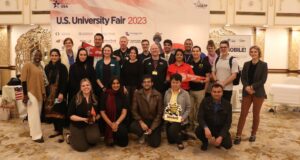ISLAMABAD: China-Pakistan Study Center (CPSC), Institute of Strategic Studies Islamabad (ISSI) in collaboration with Mishal Pakistan and Wusool hosted a webinar ‘Emerging Technologies: Important Tool to Combat COVID-19. The wabinar was attended by senior academics, researcher, media, diplomats and members of the civil society community.
Speakers from government, development sector and international institution expressed their views on significance of technology to combat the crisis. Almost 100 participants joined the online session and took part in the discussion. The session was moderated by Dr. Talat Shabbir, Director China Pakistan Study Center, Institute of Strategic Studies, Islamabad.
Ambassador Aizaz Ahmad Chaudhry, Director General Institute of Strategic Studies, Islamabad in his keynote remarks emphasized on the significance of technology to deal with COVID-19 and said that this pandemic has also brought in the consideration, how to use modern technology in a more efficient way to communicate and connect. He further said that although the technology race has already begun, but it is important to ensure its equitable access every segment of society. Moreover, for Indigenization of technology, we need to have more homegrown solutions. Research and Development at home is extremely important to detection, vaccine development, data collection and analysis. In order to deal with current health crisis, it is important to enhance regional cooperation. Regionalism could become more popular, offering new opportunities. He further said, the responsibility to combat the COVID-19 situation rests with the private sector, civil society, media and other institutions and they should work together to lessen the suffering of the people of Pakistan.
Sharing his views, Amir Jahangir, Chief Executive Officer, Mishal Pakistan, said that it is the need of hour to understand and make use of emerging technologies. Government needs to devise a system to use digital technologies for welfare of the people. Also, tax regimes on technologies help fight COVID-19 should be revisited to create more value for the citizens.
Addressing the webinar, Mr, Barkan Saeed, founder of Vizteck Solutions stated that China is successfully using thermal detectors & cameras to detect COVID19 patients. This technological advancement is helping China to combat Corona effectively.
Mr. Hassan Syed, founding member BIR Ventures during his remarks opined that to keep everything going in this hard time we need to focus on care and cure. Our top priority should be producing more ventilators, test kits and #telemedicine should be made available for masses.
Ms. Aamna Rafiq, Research Associate at ISSI stated that Corona tracking can be improved by data control, air traffic, social distance patterns, medical histories and how government handles epidemiological parameters at local/national levels of AI systems.
While sharing his views Dr. Akber Gardezi, said that while the use of technology is very important to deal with this crisis, however, it is important to note that due to weak access to technology along with poor infrastructure, , the marginalized community has become more marginalized. So it is important to create inclusion, such that the wider segment of society is benefited.
Dr. Shumail Daud, a healthcare business professional, said that Pakistan and the world needs to invest more in healthcare systems and for this technology and digitization will be the best tool. Based on the world experiences, data scientists should be working with not only the private sector but also with the public sector.
Mr Yusuf Hussain, former CEO Ignite, while sharing his views said that the COVID-19 has impacted the world at large. In Pakistan, surveillance ecosystem is being used to detect Covid-19 patients, which is very important and timely response to minimize the costs on the already fragile health system. Equally, it is important to ensure food availability to the marginalized communities. With technology taking lead in today’s world, there is an opportunity for democratization of education across the world.
Dr. Abdul Rauf while commenting said that indigenous applications must be developed to deal with the multi-layered crisis and for this more emphasis must be put on knowledge production rather than physical infrastructures.
The China Pakistan Study Center, ISSI has initiated a series of webinars (Convergences) to bring topics of public policy into debate with the stakeholders to provide input from all quarters on issues impacting the society.
Web Desk
Published in The Balochistan on April 29, 2020
 Balochistan Point Voice of Nation
Balochistan Point Voice of Nation




